Monday, January 22, 2018
While new government regulations are often an annoyance to the propane industry, some new mandates may actually drive customers to propane and away from energy sources that are more hazardous to the environment. Aside from the recent Volkswagen settlement bringing national attention to the environmental advantages of propane, the fully implemented Environmental Protection Agency (EPA) Tier 4 emission standards for off-road engines are also increasing awareness of its positive aspects. Tier 4 emission standards, which put stringent restrictions on diesel engines that require deep reductions in pollutants and particulate matter, went into full effect in 2015. In addition, California has elevated its standards, and they are more rigid than those of the federal government. 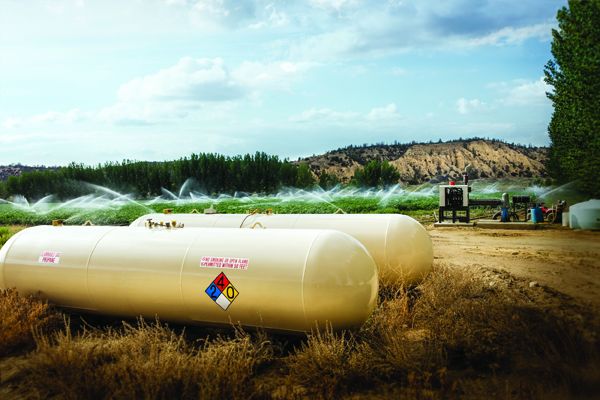
These requirements are making propane an easy-to-implement, more cost-effective alternative to diesel fuel for irrigation engines. As Tier 4 regulations began to take effect seven to eight years ago, the Propane Education & Research Council (PERC) started to work with engine manufacturers. Recognizing the new regulations would make operations more difficult for diesel fuel models, Cinch Munson, PERC’s senior vice president of business development, emphasizes, “It is important [for all to] hear about the cost-effective solutions that propane engines for irrigation systems can provide.” He adds that savings can often range from 30% to 50% considering all that is involved in buying and operating irrigation systems. Propane has a real opportunity as Tier 3 engines are completely sold out in most regions and the more expensive Tier 4 diesel engines have become the only option. Munson stressed the importance of building relationships with irrigation engine dealers because they often are the primary contact with a farmer and are able to suggest a propane engine as an option.
Experience from the Field
Every region of the country has different factors to consider regarding irrigation. “For us, electricity is cheap at around 11 to 12 cents per kilowatt hour,” said Bill Moore, who has been the alternative fuels sales manager at Conger LP Gas (Tifton, Ga.) for more than six years. Conger serves 28 counties in its region. “Electricity will be the go-to option most of the time, especially for farms along highways with easy access to electricity.” The opportunity for propane comes when farmers have fields where electricity is not easily accessible. Running lines more than a hundred extra yards rapidly becomes expensive. “This is where propane makes sense—especially when diesel engines are becoming much more expensive due to compliance with Tier 4 emissions standards that do not affect cleaner-burning propane.”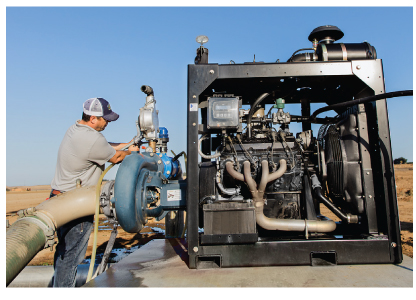
Whereas a Tier 3, which is now almost completely obsolete, 125-hp engine costs approximately $17,000 for a propane model and $19,000 for a diesel, those numbers change dramatically moving to a Tier 4, 125-hp diesel, which will cost about $29,000, according to Moore. While a Tier 3, 200-hp diesel engine still had an advantage at $22,000 versus $28,000 for a propane engine, the comparable Tier 4 diesel engine is much higher at $45,000 to $49,000.
Propane also has advantages in nearby Alabama where farmers often need to pull water from rivers because there are fewer ponds. In addition, wells have to be dug deep in order to access groundwater. Wells, at 600 to 700 feet, in many cases are cost-prohibitive to drill. Therefore, propane is the most viable option, especially because it does not contaminate water like diesel and gasoline.
Conger LP Gas is the only retail propane company in Georgia that sells propane engines for irrigation systems. Like Munson, Moore suggests that retailers who aren’t interested in selling engines should at least build a relationship with area ag equipment dealers. “They are typically just like retail propane companies as smaller, family-owned businesses. They have long-standing relationships with the farmers.” Moore also attends meetings in various counties held to educate agricultural producers. This way he can take his message directly to farmers. “I can often sponsor the meetings and have a table to display my engine and speak for five to 10 minutes.”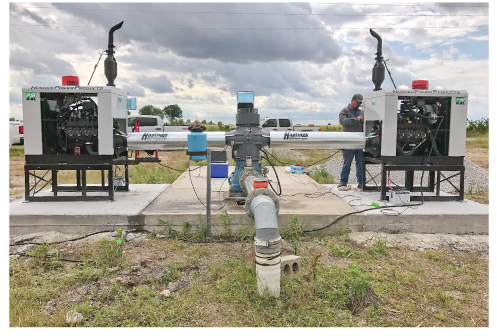
Across the country in Northern California, where regulations are far more strict and electricity rates are about double those in Georgia, Shari Pedersen, sales and marketing manager at Allied Propane Service (Dixon, Calif.), also believes relationships are important in building new business in the agriculture industry. “I grew up in this area and have a lot of contacts in the ag field,” she said. “Once we overcame some hurdles such as EPA approval and who will warranty these products, we were able to get some propane irrigation systems out into the field. From there it was word of mouth.” The word of mouth has spread faster in recent years due to an extended drought coupled with electric rates growing exponentially. “Farmers were ready to go off the grid when propane systems became economically advantageous.” Like Moore, Pedersen stresses that her new ag irrigation business didn’t happen by accident. She, too, did a lot of homework and became well versed in the irrigation systems available to be able to sell them. She credits Greg Gilbert, an air quality consultant with Autumn Wind Associates who also consults with the Western Propane Gas Association, and Munson at PERC for helping her in the process.
Delta Liquid Energy of Paso Robles, Calif., with multiple locations in the region, also recognizes the work of Munson, Gilbert, and their organizations. Robert Jacobs, vice president of business enterprises and a past chairman of the PERC Agriculture Advisory Committee, is certain that without PERC all the platforms from engine manufacturers now available for propane irrigation would not exist. “The irrigation systems have been a wonderful addition to our book of business. This provides summer load. The business does not come easy, and service and support are critical to the customer relationship if there are any issues with the engines.”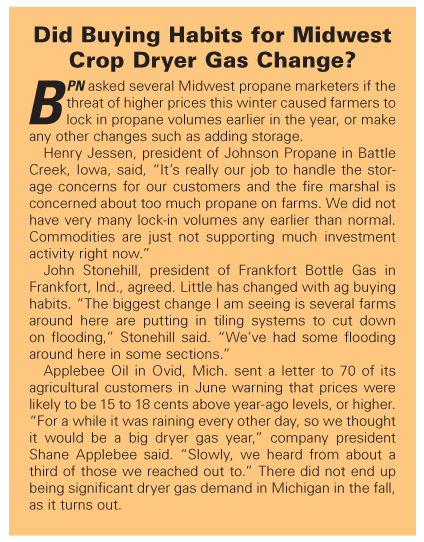
Munson and others agree that changes in the ag industry sometimes come slowly, especially when money is tight. “[This is] especially true in the Midwest right now, where commodities like grain, corn, and soybeans are really low in value. Farmers were in no hurry to pay more to dry the product and get it to market. Some are storing it to see if the market will rebound,” he said. “PERC promotes ag programs in all regions regardless of the commodity or financial situations at given times. It is important that all keep hearing about the cost-effective solutions available to them.” Beyond irrigation, Munson pointed out new efficiency in grain dryer technology, water heat, and building heat. He said organic acres are expanding significantly, although flame weeding used by organic farmers doesn’t require a lot of gallons. Irrigation is garnering the most anticipation of significant growth for propane use in agriculture. “Manufacturers are talking about moving to bigger propane engines. They see that propane engines for irrigation are the way of the future.” Munson also noted that some retail marketers incorrectly discount the value of ag customers because the margins are typically lower. “You can still sell about as many gallons for one propane irrigation engine as you would to heat 10 homes.” he said.
Looking Ahead
While Moore believes that electricity will hold on to the greatest market share for irrigation engines in Georgia, he sees plenty of opportunity for propane over diesel where electric lines are unavailable or impractical. Participants in a 2013 PERC Propane Farm Incentive Program who received up to $5000 toward the purchase of new propane-fueled farm equipment, including irrigation engines and grain dryers, were required to share real-world performance data with PERC. Those who purchased propane irrigation engines reported reducing their fuel cost per hour by nearly 56% compared to diesel models.
Justin Osborne, president of Industrial Irrigation Systems based in Hastings, Neb., agreed that EPA is putting diesel at a disadvantage. He noted that there is increased interest in propane due to rebates, and said he believes PERC has done a fantastic job of educating the ag industry about the possibilities with propane. Bill Heese, sales account manager at Husker Power Products, also based in Hastings, Neb., reviewed that his company started as a diesel engine distributor. “We’re not anti-diesel,” he said. “Customers understand we promote propane irrigation engines because they are on the upswing.” He observes that farmers are not only accepting of new technology to make their farms run more cost-effectively and efficiently, they are demanding it. “Our newest propane irrigation systems provide every benefit farmers have come to expect from electric irrigation systems. We have a wide range of sizes and many aspects of the system can be controlled remotely.”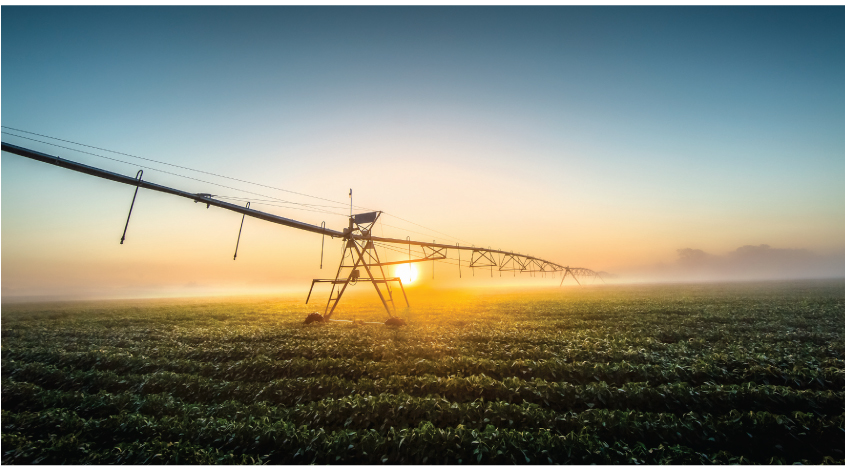
Gilbert, who is widely regarded as having a wealth of knowledge about California’s air quality regulations, said he believes propane has all the benefits to take sizable market share from both electricity and diesel for quite a while in California. He agrees that farmers, especially those among the younger generation, are demanding better technology, although he cautions against counting diesel out forever. Gilbert expects a large amount of money will be directed to improving diesel systems to make them more user-friendly and lower their cost per unit.
He comments that while electricity pollutes, it gets a pass since its emissions are released at power plants. In California, he associates propane irrigation systems with more freedom. Users of propane systems have the freedom to move the engines around, the freedom to choose their gas company, the freedom to use the system regardless of peak and off-peak timeframes that affect electric systems, the freedom from diesel systems that can’t increase or decrease speed, the freedom from diesel vessels that are required to catch spillage, the freedom from the concern the someone can siphon off the fuel and, of course, the freedom from excess spending. “Propane is plug and play.” —Pat Thornton

These requirements are making propane an easy-to-implement, more cost-effective alternative to diesel fuel for irrigation engines. As Tier 4 regulations began to take effect seven to eight years ago, the Propane Education & Research Council (PERC) started to work with engine manufacturers. Recognizing the new regulations would make operations more difficult for diesel fuel models, Cinch Munson, PERC’s senior vice president of business development, emphasizes, “It is important [for all to] hear about the cost-effective solutions that propane engines for irrigation systems can provide.” He adds that savings can often range from 30% to 50% considering all that is involved in buying and operating irrigation systems. Propane has a real opportunity as Tier 3 engines are completely sold out in most regions and the more expensive Tier 4 diesel engines have become the only option. Munson stressed the importance of building relationships with irrigation engine dealers because they often are the primary contact with a farmer and are able to suggest a propane engine as an option.
Experience from the Field
Every region of the country has different factors to consider regarding irrigation. “For us, electricity is cheap at around 11 to 12 cents per kilowatt hour,” said Bill Moore, who has been the alternative fuels sales manager at Conger LP Gas (Tifton, Ga.) for more than six years. Conger serves 28 counties in its region. “Electricity will be the go-to option most of the time, especially for farms along highways with easy access to electricity.” The opportunity for propane comes when farmers have fields where electricity is not easily accessible. Running lines more than a hundred extra yards rapidly becomes expensive. “This is where propane makes sense—especially when diesel engines are becoming much more expensive due to compliance with Tier 4 emissions standards that do not affect cleaner-burning propane.”

Whereas a Tier 3, which is now almost completely obsolete, 125-hp engine costs approximately $17,000 for a propane model and $19,000 for a diesel, those numbers change dramatically moving to a Tier 4, 125-hp diesel, which will cost about $29,000, according to Moore. While a Tier 3, 200-hp diesel engine still had an advantage at $22,000 versus $28,000 for a propane engine, the comparable Tier 4 diesel engine is much higher at $45,000 to $49,000.
Propane also has advantages in nearby Alabama where farmers often need to pull water from rivers because there are fewer ponds. In addition, wells have to be dug deep in order to access groundwater. Wells, at 600 to 700 feet, in many cases are cost-prohibitive to drill. Therefore, propane is the most viable option, especially because it does not contaminate water like diesel and gasoline.
Conger LP Gas is the only retail propane company in Georgia that sells propane engines for irrigation systems. Like Munson, Moore suggests that retailers who aren’t interested in selling engines should at least build a relationship with area ag equipment dealers. “They are typically just like retail propane companies as smaller, family-owned businesses. They have long-standing relationships with the farmers.” Moore also attends meetings in various counties held to educate agricultural producers. This way he can take his message directly to farmers. “I can often sponsor the meetings and have a table to display my engine and speak for five to 10 minutes.”

Across the country in Northern California, where regulations are far more strict and electricity rates are about double those in Georgia, Shari Pedersen, sales and marketing manager at Allied Propane Service (Dixon, Calif.), also believes relationships are important in building new business in the agriculture industry. “I grew up in this area and have a lot of contacts in the ag field,” she said. “Once we overcame some hurdles such as EPA approval and who will warranty these products, we were able to get some propane irrigation systems out into the field. From there it was word of mouth.” The word of mouth has spread faster in recent years due to an extended drought coupled with electric rates growing exponentially. “Farmers were ready to go off the grid when propane systems became economically advantageous.” Like Moore, Pedersen stresses that her new ag irrigation business didn’t happen by accident. She, too, did a lot of homework and became well versed in the irrigation systems available to be able to sell them. She credits Greg Gilbert, an air quality consultant with Autumn Wind Associates who also consults with the Western Propane Gas Association, and Munson at PERC for helping her in the process.
Delta Liquid Energy of Paso Robles, Calif., with multiple locations in the region, also recognizes the work of Munson, Gilbert, and their organizations. Robert Jacobs, vice president of business enterprises and a past chairman of the PERC Agriculture Advisory Committee, is certain that without PERC all the platforms from engine manufacturers now available for propane irrigation would not exist. “The irrigation systems have been a wonderful addition to our book of business. This provides summer load. The business does not come easy, and service and support are critical to the customer relationship if there are any issues with the engines.”

Munson and others agree that changes in the ag industry sometimes come slowly, especially when money is tight. “[This is] especially true in the Midwest right now, where commodities like grain, corn, and soybeans are really low in value. Farmers were in no hurry to pay more to dry the product and get it to market. Some are storing it to see if the market will rebound,” he said. “PERC promotes ag programs in all regions regardless of the commodity or financial situations at given times. It is important that all keep hearing about the cost-effective solutions available to them.” Beyond irrigation, Munson pointed out new efficiency in grain dryer technology, water heat, and building heat. He said organic acres are expanding significantly, although flame weeding used by organic farmers doesn’t require a lot of gallons. Irrigation is garnering the most anticipation of significant growth for propane use in agriculture. “Manufacturers are talking about moving to bigger propane engines. They see that propane engines for irrigation are the way of the future.” Munson also noted that some retail marketers incorrectly discount the value of ag customers because the margins are typically lower. “You can still sell about as many gallons for one propane irrigation engine as you would to heat 10 homes.” he said.
Looking Ahead
While Moore believes that electricity will hold on to the greatest market share for irrigation engines in Georgia, he sees plenty of opportunity for propane over diesel where electric lines are unavailable or impractical. Participants in a 2013 PERC Propane Farm Incentive Program who received up to $5000 toward the purchase of new propane-fueled farm equipment, including irrigation engines and grain dryers, were required to share real-world performance data with PERC. Those who purchased propane irrigation engines reported reducing their fuel cost per hour by nearly 56% compared to diesel models.
Justin Osborne, president of Industrial Irrigation Systems based in Hastings, Neb., agreed that EPA is putting diesel at a disadvantage. He noted that there is increased interest in propane due to rebates, and said he believes PERC has done a fantastic job of educating the ag industry about the possibilities with propane. Bill Heese, sales account manager at Husker Power Products, also based in Hastings, Neb., reviewed that his company started as a diesel engine distributor. “We’re not anti-diesel,” he said. “Customers understand we promote propane irrigation engines because they are on the upswing.” He observes that farmers are not only accepting of new technology to make their farms run more cost-effectively and efficiently, they are demanding it. “Our newest propane irrigation systems provide every benefit farmers have come to expect from electric irrigation systems. We have a wide range of sizes and many aspects of the system can be controlled remotely.”

Gilbert, who is widely regarded as having a wealth of knowledge about California’s air quality regulations, said he believes propane has all the benefits to take sizable market share from both electricity and diesel for quite a while in California. He agrees that farmers, especially those among the younger generation, are demanding better technology, although he cautions against counting diesel out forever. Gilbert expects a large amount of money will be directed to improving diesel systems to make them more user-friendly and lower their cost per unit.
He comments that while electricity pollutes, it gets a pass since its emissions are released at power plants. In California, he associates propane irrigation systems with more freedom. Users of propane systems have the freedom to move the engines around, the freedom to choose their gas company, the freedom to use the system regardless of peak and off-peak timeframes that affect electric systems, the freedom from diesel systems that can’t increase or decrease speed, the freedom from diesel vessels that are required to catch spillage, the freedom from the concern the someone can siphon off the fuel and, of course, the freedom from excess spending. “Propane is plug and play.” —Pat Thornton

